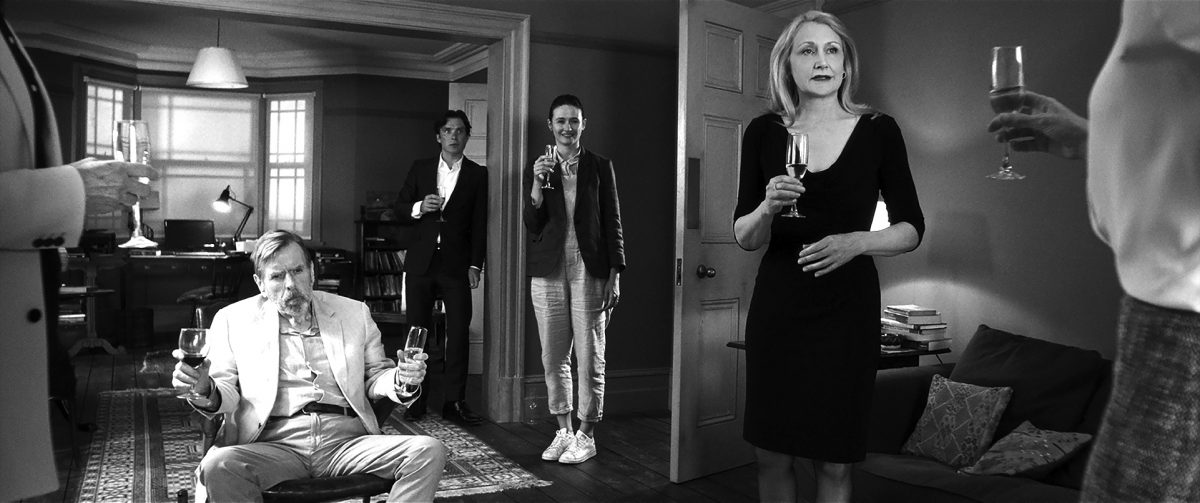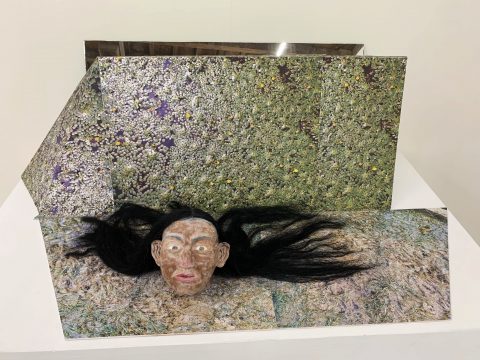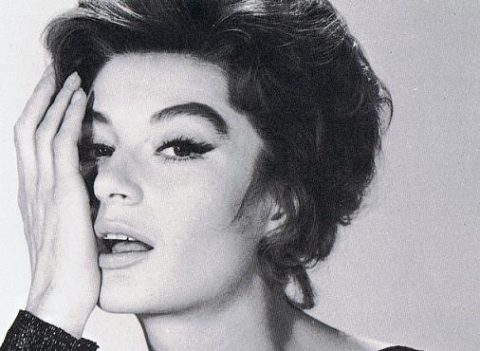Newest feature of British filmmaker SALLY POTTER world premieres in competition at the Berlin Film Festival.
“The Party” is centered on a gathering of friends to celebrate the promotion of Janet, a politician, who has just been promoted to the top tier of her party or to the role of shadow health secretary. The planned celebration quickly descends into farce, owing to the characters’ deceitful behavior towards each other. Shot in black and white and set in the confines of a London house, the film stars Christine Scott Thomas, Patricia Clarkson, Cillian Murphy, Cherry Jones, Emily Mortimer and Bruno Ganz. British director Sally Potter talks to kino-kunst.de about her new film.

Congratulations to the film. How is it, to be back to Berlin?
It is lovely to be back and it’s a wonderful thing to stand in the cinema theater and feel everybody’s laughing. I think laughter releases tension, especially tension in the mind. Afterwards we are somehow refreshed and ready to take life as it is. I love watching films that are really funny, mixtures of pathos and comedy, like those of Charley Chaplin. When you’re writing a script and making a film you never know how people will respond. It’s quite validating after all to hear them laughing.
When you started your project two years ago, could you imagine that it would have so many routes in the reality?
When I first started writing it, which was during the general election in the UK, nothing like what has happened subsequently was in my mind. The feeling must be in the air. Once you start going into characters it’s all there already. Because everything that happens in the world, like Trump or Brexit, it does not come from nowhere, but it was already under the ground. However big part of my motivation apart from telling this kind of political truth I wanted to create an entertainment, I wanted to make people have the opportunity to laugh on the edge of tragedy.
Is “The Party” a portrait of broken England?
I don’t like the idea of statements. I wanted to make people laugh. But indeed my story is dealing with quite English issues like health service, or ‘health’ of politics. I only finished it three days before Christmas. If I were to write it again, I would probably think differently as we have an extreme situation now to find useful spiritually rich ways of meeting very difficult global dynamic. Some of the aspects of writing are always very technical like how to tell this certain story in this period of time. I was very interested in how to keep seven characters going which is a big technical challenge, how to show them equally meaningful. There are no bad or good characters. Each person is a mixture of both to discover in different moments. I was interested to watch those people in the moment of change when the crisis reveals to each of them that they are not who they thought they are.
Why it takes so long for you to make a film?
It does not really take so long, unless you write your own script. The longest part of the process is writing. I can’t write a good script in less than a year. Well, I can write a first draft in few weeks, but scripts are not written, they are re-written, it’s all the revision that makes it. Casting and financing takes maybe up to a year. Shooting took two weeks in this case, on one location, which brings all the costs down. Six months I spent editing, three of them worked on the images and the sound. Financing was not difficult as this is very low budget project. Everyone was paid absolute minimum, cast included. Luckily I had nothing to do with the big industry, and with special effects.
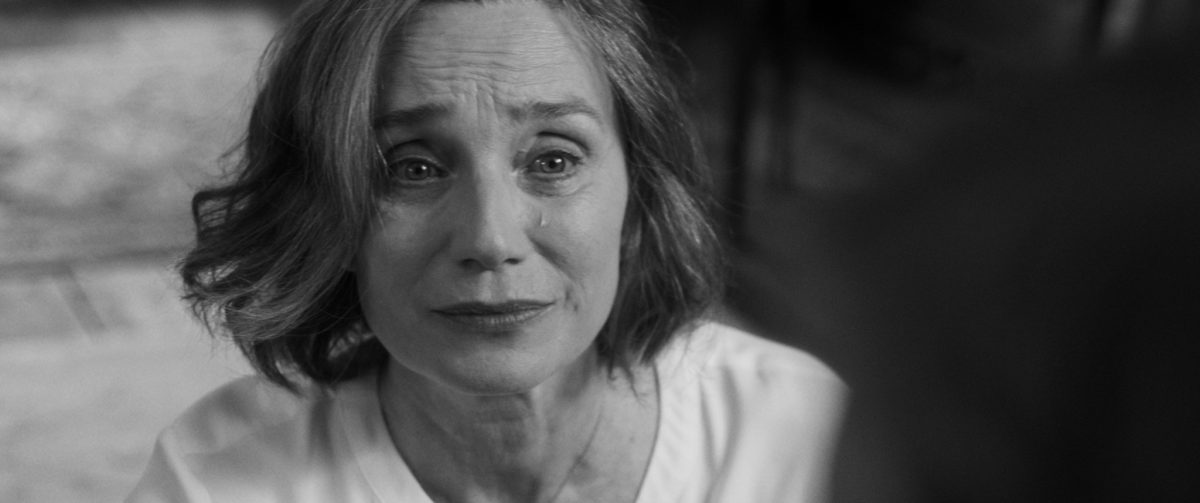
How did you work with your exceptional cast?
I do a lot of research about each person’s work. I watch as much as I can of everything actors have ever done. It’s in a way a process of falling in love with those people, professionally speaking. I always work individually with each actor on its part and character, on the text as a whole. I build relationship with each actor. By the time everybody comes together for rehearsal they already know me very well and I know them and they know their parts. When you finally put people together, the dynamic is very interesting. In the moment of shooting they feel trusted enough to take risks.
Can you speak about your choice of music?
I love working with music as I used to be a musician. But in this case the challenge was how to create the character played by Timothy Spall with it. What would he have in his record collection? I decided that it would be world music. Each parts of the world would represent a part of his wish for himself, like wildness of the gipsy music or beauty of Rubén González. The music expresses things about him that he, as an Englishman, could not express.
How did the speed of the shooting affected the rhythm of the film?
My intention was that the rhythm of the film would be ‘fast and furious’. All of our time is so precious and I don’t like when my time is wasted. I wanted to do short, sharp, precise, to the point, funny, “in set – through it and out”.
Why did you decide for black-and-white?
The simple answer is that I love it, the monochromatic world and the graphic things you could do with it.
How did you pick your cinematographer?
Aleksei Rodionov is an amazing Russian cinematographer whom I had the great pleasure to work with for the first time on “Orlando” when I discovered his ability of making things happen with a piece of string, a rubber band, and very good eyesight. It wasn’t about having a huge technological advantage but about having amazing imagination and the ability to do a lot with a little. He brings a deeply character-orientated way of shooting. It’s a very deep form of looking and listening, within the Russian tradition of lighting the face to bring out the dramatic qualities of the scene.
The character played by Patricia Clarkson is quite special …
Indeed! I was not sure whether it should be a male, a female or a transgender character. There was some kind of quality of speaking out the truth. I consciously knew that this character would have the best lines. She is the one who would always say the things other people might be only thinking. She breaks taboos all the time. She appears to be a cynic but to the end of the film you’ll realize the opposite that she loves her friends, her partner, and this critical rigorousness is in fact the form of love and tenderness.
Are you the character?
I am all of them, I hope. When I write a script I need to love all my characters absolutely equally. My job is not to write about people like me but to try the shoes of others.
Your leading characters are females, self-sufficient but upset and bitter. Are you disappointed with the feminism movement?
Not at all! All fights for liberation are very long processes. The difference between the time when I made “Orlando” and the recent project “The Party” is that “Orlando” was much closer to the beginning of the women’s liberation movement. In those 25 years there have been backlash. One of the things that happened at the beginning of the movement was this hope that everything would be light, sweet, positive and wonderful into the future. Whereas in reality women have terrible fights with each other, they do have disappointments. In all political movements there was a hope in all those big liberation marches. 1 Million people in the UK voted against the invasion of Iraq, I was one of them, and guess what, it happened. Meanwhile I think that marching was not enough. But this struggle has not been forgotten it is just going in waves.
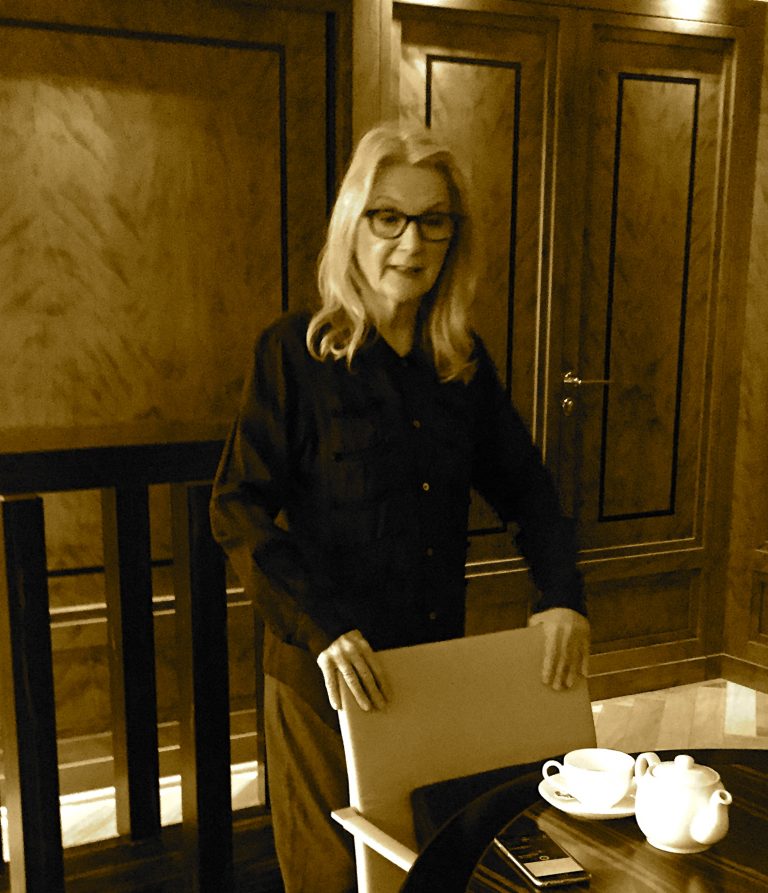
Do you think you could change something with your art?
Yes, I do. I’ve always been active. I went to my first march when I was eleven. It was anti-nuclear demonstration and I’ve never stopped marching if for one thing or another. At the moment I’ve been like many other people watching so much news and it feels like such a big crisis. And there is not a good time for the artists because the prosecution of intelligence was always the first stage of totalitarian state. But I keep asking myself, “What can I change with my particular skills?” or “What can I give out into the world to help it to be better?” The answer is not clear. I can’t be delusional about film itself. Cinema is not going to change the world. But maybe it can have a simple ambition like to make people laugh, because laughter can make people stronger. Even though it is maybe a limited ambition. But I think it’s the time to be very strategic – not really that I was strategic with this film – but for me is important to get people into the theater is make them feel that they are going to have fun, without being lectured of what they should be thinking. They will start thinking at some point.
